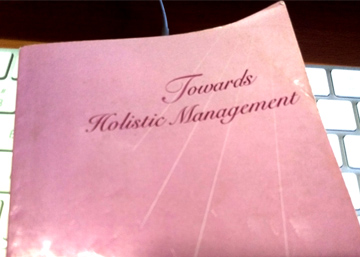Towards Holistic Management
At present management as a profession and a science is in a state of transition. There is a seeking for something higher than profit, productivity and efficiency and deeper sources of motivation beyond money and career advancement. To pass through the transition and take a decisive step in its higher evolution, management needs a higher and a more holistic vision which includes the psychological and spiritual dimension of the individual and collective life of human beings and human life as a whole. This book under review can provide such a vision.
This book is a compilation from Sri Aurobindo’s and the Mother’s writings and conversations on management or to be more precise, management- related subjects like Self- Management, Developing the Human Potential, Organisational Development, Decision Making, Quality of Work-life, Management of Money and Material, each one forming a chapter of the book.
The book begins with an interesting letter of Sri Aurobindo on Business and Spirituality where he says, referring to the teachings of Sri Krishna in Bagavad Gita: “It is in his view quite possible for a man to do business and make money and earn profits and yet be a spiritual man, practice Yoga, have an inner life.” But how it is possible? “All depends on the spirit in which a thing is done” says Sri Aurobindo “the principle on which it is built and the use to which it is turned”.
Each chapter of the book begins with a brief and crisp intro which sums up the significance of the title for management. For example intro to the chapter on Self–management states “right management of the internal self is the key to the successful management of the outer life” And in a passage in this chapter the Mother elaborates on this idea. “One can’t control the outer matter” says the Mother “if one does not control inner matter, for they are the same thing… first you have the control in yourself and once you have it in yourself you can transmit the vibration to others…”
The chapter on “Developing the Human Potential “ presents an evolutionary perspective on human growth and deals with many functions related to management like motivation, leadership coaching and mentoring . In an interesting passage in this chapter, Sri Aurobindo describes the ideals and qualities of true business man, based on the Indian concept of the Vysya, the type and temperament of the commercial soul, looking at it at a much deeper psychological perspective, which we cannot find either in ancient Indian or in modern management thinking.
Similarly, the Chapter on the “Quality of Work life” brings out the true meaning of work and action in a spiritual perspective and contains practical guidelines on how to achieve progress and perfection in work and build harmony in work-life. In this way each chapter throws deep insights into the inner dimensions of the different facets and functions of management
For those who are seeking for the deeper truth and the higher ideals in management, this book can provide valuable guidance. The pragmatic mind of a modern manager may find the book more visionary than practical. But we can’t expect spiritual personalities like Sri Aurobindo and the Mother to get into the nuts and bolts of management practice.
M S Srinivasan

